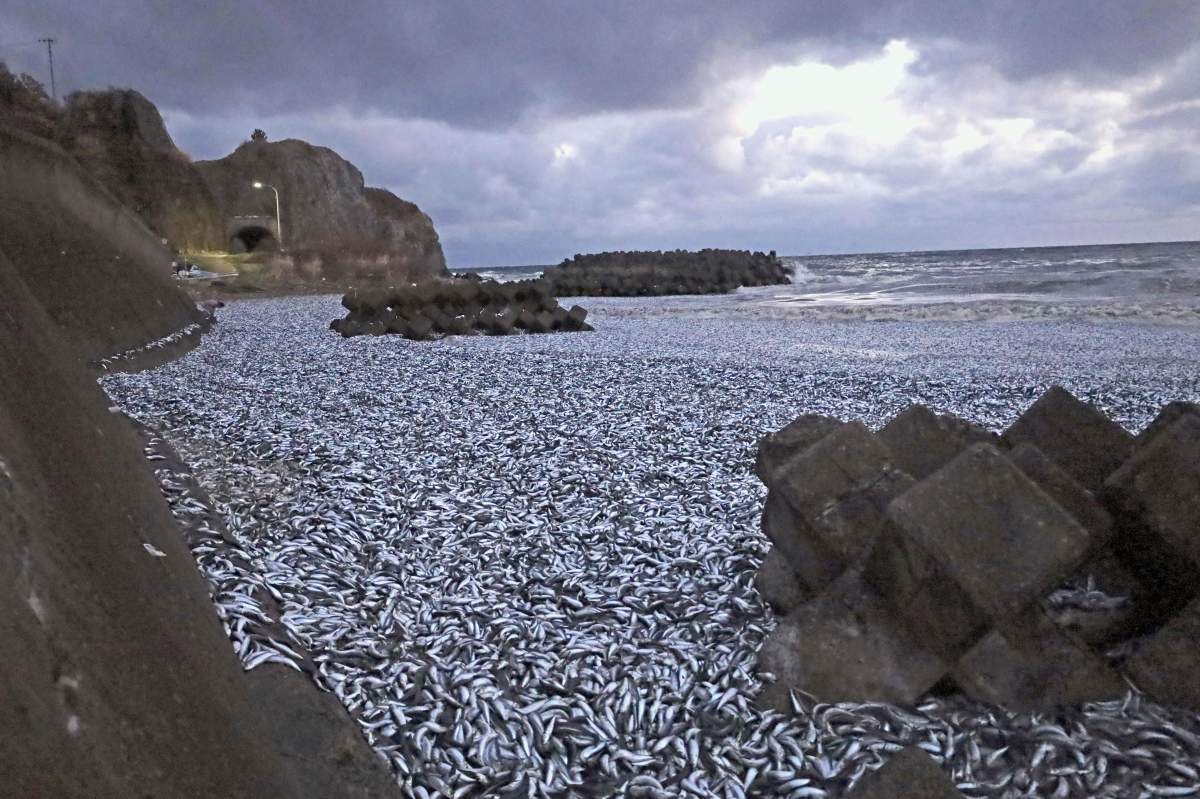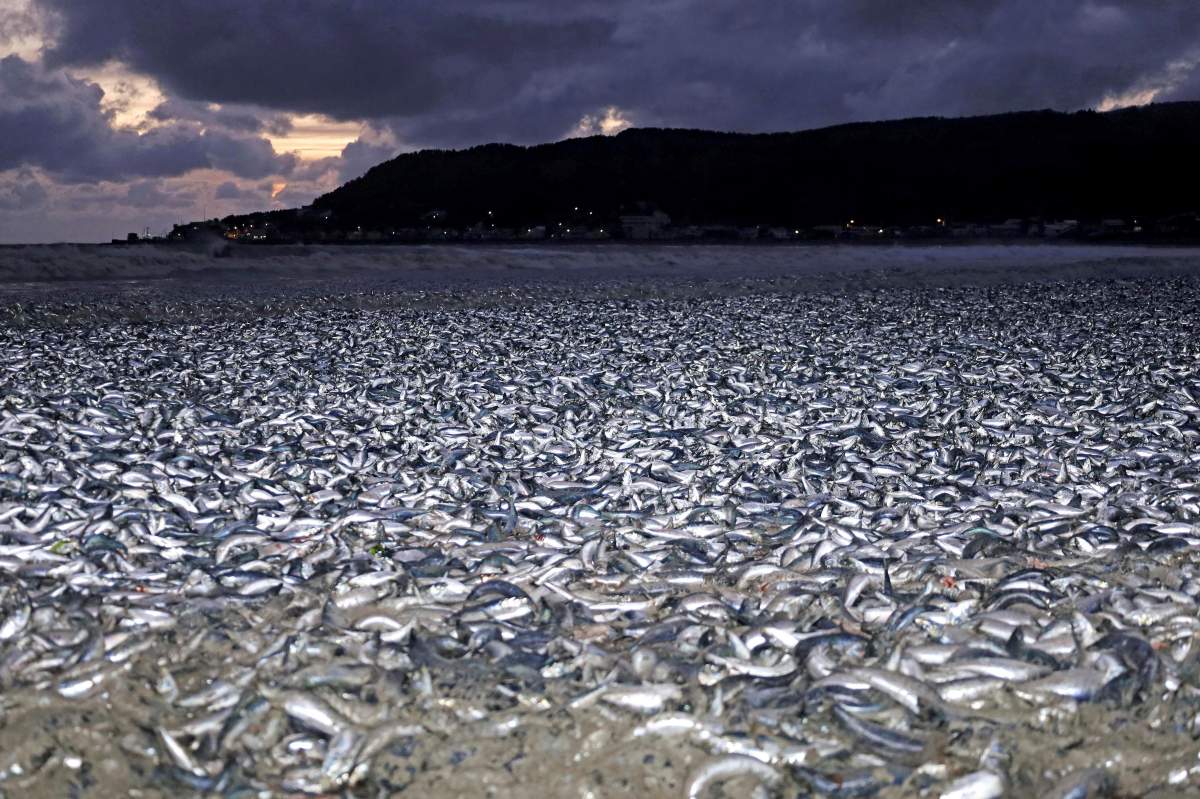Over a thousand of tonnes of dead sardines and mackerel washed ashore in two locations in Japan last week and on Tuesday, leaving officials baffled.

While the cause of the die-offs is unknown, Japanese fishery officials are battling rumours that the incidents are connected with the Fukushima Daiichi nuclear plant, which melted down in 2011. Japan began releasing treated wastewater from the plant three months ago as it continues to decommission the wrecked nuclear facility.
The first die-off occurred in Hakodate on Japan’s northernmost main island of Hokkaido on the morning of Dec. 7. The sheer volume of fish that washed ashore created a silver blanket along a stretch of beach about a kilometre long.
Local residents said they have never seen anything like it. Some gathered the fish to sell or eat, the Associated Press reported.
In a notice to residents that morning, the city of Hakodate wrote that the cause of the incident is unknown and warned residents not to consume the fish.
Officials first estimated that at least 1,000 tonnes of sardines and mackerel washed up on the beach but that estimate was bumped up to 1,200 tonnes a few days later, according to reports from the Asahi Shimbun.
On Tuesday, more sardines, specifically Japanese scaled sardines called “sappa,” washed ashore in droves at the Nakiri fishing port in Shima, Mie Prefecture, on the southeastern coast of Japan, the Mainichi Shimbun reports.

Get daily National news
Officials estimated that some 30 to 40 tonnes of fish died.
“I’ve never seen anything like this before,” a fisherman operating in Nakiri for 25 years told the outlet. “It was only around last year that we began to catch sappa in Nakiri. It makes me feel the marine ecosystem is changing.”
Mikine Fujiwara, an official at Ise Agriculture, Forestry and Fisheries Office in Mie Prefecture, said that the cause of the die-off is “unknown at the moment.”
“We’d like to sample the seawater at the site and examine it at a fisheries research centre to uncover the cause,” she told Mainichi.
Local fishermen noted that large schools of sappa began congregating inside the Nakiri port on Monday evening. The next day, dead fish began to surface in the water. By Tuesday morning, the volume of dead fish washing ashore continued to grow.
- Trump says Kennedy Center to be closed for 2-year renovation project
- Judge orders 5-year-old Liam Conejo Ramos and his dad released from ICE detention
- Earliest launch date for Artemis II set for Feb. 8 after cold weather delay: NASA
- Jeffrey Epstein denied permission to visit Canada in 2018, documents show
Officials in Hakodate and Mie Prefecture have speculated that the dead fish may have been chased by larger fish, such as amberjack, eventually running out of oxygen while moving in a densely packed school or within the confined space of the port.
Takashi Fujioka, a Hakodate Fisheries Research Institute researcher, said that the fish may have also suddenly entered a patch of cold water that could have caused the mass mortality.
Fujioka recommends that locals do not eat the fish because of the unknown circumstances of their deaths.
British tabloid Daily Mail reported on the dead Japanese fish washing ashore and suggested that it could be connected with the release of wastewater from the melted-down Fukushima Daiichi nuclear power plant. The wastewater release plan began on Aug. 24.

“We are concerned about the unsubstantiated information,” the Fisheries Agency said, in reference to the Daily Mail report, according to the Asahi Shimbun.
“There have been no abnormalities found in the results of water-monitoring surveys,” the Fisheries Agency added. “We are concerned about the proliferation of information that is not based on scientific evidence.”
The plan to release nuclear wastewater stored at the Fukushima Daiichi plant since a tsunami caused it to melt down in 2011 was green-lit by the International Atomic Energy Agency (IAEA) in July.
The IAEA said that the treated wastewater met international standards for release and that the expected impact on people and the environment would be “negligible.”
But that hasn’t stopped neighbouring countries from expressing their concern about the plan. China has since imposed a ban on Japanese seafood imports.

Jason Donev, a professor of physics at the University of Calgary who specializes in nuclear energy, believes the water is safe for release.
He told Global News that much of the radioactivity in the water has decayed, and in addition, the water will go through a filtration system called the Advanced Liquid Processing System, or ALPS.
“It is basically a really, really good filtration system,” Donev said. “That water is now safe. It’s fine.”
Donev said that water from nuclear plants is dumped into bodies of water all the time around the world, so the practice isn’t new.
Japanese fishing organizations strongly opposed Fukushima’s water release, over worries about further damage to the reputation of their seafood as the industry struggles to recover.
— With files from the Associated Press and Global News’ Eric Stober










Comments